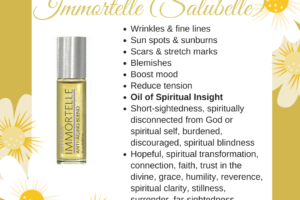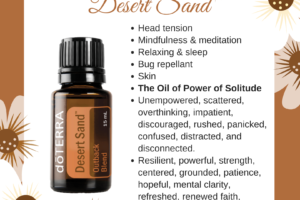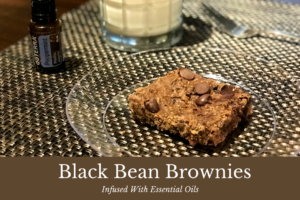You also might be interested in
Immortelle (AKA Salubelle) is a very sophisticated blend of oils that have been well documented for beautification. The Egyptians uses these oils for beautification and embalming. These oils are amazing at preserving the cells and reminding cells how they should function. When in doubt, use Immortelle!! It is great for the immune system but it goes well beyond that with it's high vibrations.
This small evergreen shrub has grown in Spain and France for centuries. The smell of CPTG® Spanish Sage essential oil is camphoraceous, herbal, and sage-like. When diffused, the oil may create a stimulating atmosphere supportive of memory and cognitive performance training. When taken internally, Spanish Sage supports a calm mind and sense of alertness.† Camphor and 1,8-Cineole—the primary chemical constituents in Spanish Sage—make the essential oil an ideal addition to a post-sports or deep-tissue massage.
We all want to enjoy a treat every now[...]
Hi. I’m Jade, a passionate holistic health educator who loves helping people learn about essential oils and natural solutions. I also help people heal and grow themselves and their business through energy balancing with faith.
Events
Sign up for my weekly love letters
Energy Balancing Course
Book An Energy Healing Appointment
Natural Wellness Lifestyle Course

Enrollment Open! Learn how to use the dōTERRA products and essential oils for your everyday needs. Be confident taking care of yourself and your family’s health and wellness.
Get My New Book(s)

I am so happy to announce the availability of my books – some coming soon and some available now.
My Book: Pink Jade 2020 Edition

This is my refugee story. I tell my story of growing up during a time of conflict in war-torn Vietnam, and escaping at a very young age as a refugee. How my family escaped by boat and narrowly escaped death and made new lives for ourselves in a new country. Available anywhere good books are sold.
Get The Podcast
FREE eBOOK
Recent Posts
Categories
- Anchoring & Aligning the Heart
- Blends & DIY
- Blue & Presidential Diamonds
- Business Building Basics
- Diamond
- Divine Love – The Spirit
- Eating Right
- Elite
- Energy Balancing & Holistic Connections
- Energy Balancing Basics & Resources
- Energy Balancing with Essential Oils
- Essential Oil Blends
- Essential Oil Education
- Exercise & Movement
- Gold & Platinum
- Informed Self-care
- Jade's Recipes
- Light – The Mind
- Literal Language of the Body
- Practitioners
- Premier
- Rank Beliefs
- Reduce Toxic Load
- Rest & Manage Stress
- Scripture Solutions
- Silver
- Single Essential Oils
- Support
- True Healing – The Body
- Trying It All Together
- Uncategorized
- Understanding Emotions
- Wellness Products
- 😀 Business Building with Faith
- 😀 Energy Balancing
- 😀 Gifts of Earth
- 😀 Natural Wellness Lifestyle
dōTERRA Certified Site
Get a FREE Sample
*Free samples are available to anyone who has never tried doTERRA essential oils. (Limited to US and Canada)















